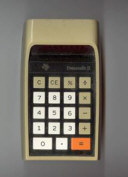
DATAMATH CALCULATOR MUSEUM
 |
DATAMATH CALCULATOR MUSEUM |
UNIVERSAL Computer
| Date of introduction: | December 1980 | Display technology: | LCD |
| New price: | Display size: | 8 + Sign | |
| Size: | 4.6" x 2.6" x
0.35" 116 x 66 x 9 mm3 |
||
| Weight: | 1.9 ounces, 54 grams | Serial No: | 271072 |
| Batteries: | n.a. | Date of manufacture: | wk 51 year 1980 |
| AC-Adapter: | Origin of manufacture: | Spain (MCS) | |
| Precision: | 8 | Integrated circuits: | TP0314 |
| Logic: | Chain | Displays: | |
| Memories: | 1 | ||
| Program steps: | Courtesy of: | Joerg Woerner |

![]()

 In
February 2024 fellow calculator collector Álvaro from Spain surprised us with an
email that he located a rare calculator on the classified listings website
Wallapop that seemed to be a rebranded
TI-1030. Álvaro was not only
kind enough to broker the purchase for us but even shipping the featured
UNIVERSAL Computer to a friend in Germany who aggregates our European calculator
acquisitions. Thanks! And now, about six weeks later we are sitting in front of
this unusual "Computer" with its Roman numerals and try to fully understand the
product.
In
February 2024 fellow calculator collector Álvaro from Spain surprised us with an
email that he located a rare calculator on the classified listings website
Wallapop that seemed to be a rebranded
TI-1030. Álvaro was not only
kind enough to broker the purchase for us but even shipping the featured
UNIVERSAL Computer to a friend in Germany who aggregates our European calculator
acquisitions. Thanks! And now, about six weeks later we are sitting in front of
this unusual "Computer" with its Roman numerals and try to fully understand the
product.
![]() The featured UNIVERSAL Computer with the
Date code 5180 MCS was obviously manufactured
by Texas Instruments in Spain. Comparing the label area of the UNIVERSAL
Computer with a TI-1071 Basic Calculator manufactured on the same assembly line
shows the first surprise: The mold of the housing was altered in a way that some
information is missing, namely "Texas Instruments", "electronic calculator", the
list of some calculator related "US Patents" and the "Assembled In" wording.
The featured UNIVERSAL Computer with the
Date code 5180 MCS was obviously manufactured
by Texas Instruments in Spain. Comparing the label area of the UNIVERSAL
Computer with a TI-1071 Basic Calculator manufactured on the same assembly line
shows the first surprise: The mold of the housing was altered in a way that some
information is missing, namely "Texas Instruments", "electronic calculator", the
list of some calculator related "US Patents" and the "Assembled In" wording.

 Dismantling the featured UNIVERSAL Computer reveals another surprise, it
uses not only the printed circuit board (PCB) of the
TI-1071 but even its TP0314 single-chip
calculator circuit. Consequently did we expect a direct mapping of the Roman
numerals with the TI-1071 keyboard functions and started some calculations. And
yes, [DIS] = [=], [I] = [+], [II] = [−], [III] = [×], [IV] = [÷] and [VI] =
[√x]. But the [V] key
didn't register [pi] and using the three keys covered by the UNIVERSAL Computer
logo resulted in a functional [1/x] operation but the [x2] calculation failed.
Dismantling the featured UNIVERSAL Computer reveals another surprise, it
uses not only the printed circuit board (PCB) of the
TI-1071 but even its TP0314 single-chip
calculator circuit. Consequently did we expect a direct mapping of the Roman
numerals with the TI-1071 keyboard functions and started some calculations. And
yes, [DIS] = [=], [I] = [+], [II] = [−], [III] = [×], [IV] = [÷] and [VI] =
[√x]. But the [V] key
didn't register [pi] and using the three keys covered by the UNIVERSAL Computer
logo resulted in a functional [1/x] operation but the [x2] calculation failed.
 A further examination of the keyboard assembly quickly disclosed a minor
modification of the keys in the right two columns of the top two rows,
explaining the observed behavior of UNIVERSAL Computer.
A further examination of the keyboard assembly quickly disclosed a minor
modification of the keys in the right two columns of the top two rows,
explaining the observed behavior of UNIVERSAL Computer.
 We
certainly understand the technology of this unique UNIVERSAL Calculator
manufactured in 1980 by Texas Instruments in Spain but we definitely do not
understand its intended purpose. We assume that the featured product was just a
demonstrator before the actual design of the actual single-chip calculator
circuit was finalized. This might explain the Date code 7824 (June 1978) of the
used TP0314 chip in a product assembled in December 1980.
We
certainly understand the technology of this unique UNIVERSAL Calculator
manufactured in 1980 by Texas Instruments in Spain but we definitely do not
understand its intended purpose. We assume that the featured product was just a
demonstrator before the actual design of the actual single-chip calculator
circuit was finalized. This might explain the Date code 7824 (June 1978) of the
used TP0314 chip in a product assembled in December 1980.
If you have additions to the above article please email: joerg@datamath.org.
© Joerg Woerner, April 5, 2024. No reprints without written permission.